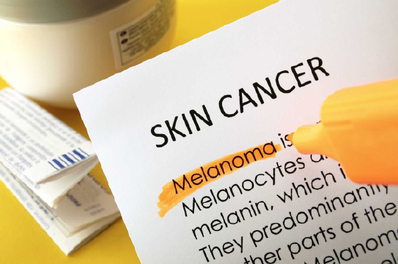
IN 2007, Philip Collins, a Briton who loved the outdoor life in Thailand and maintained an incredible level of fitness for a 70-year-old, was disagnosed with skin cancer. Two years later, after a slow but agonising demise, he finally succumbed to the disease.
His devastated son Robert, a 20-year veteran of this country’s property industry, is in no doubt what caused his dad’s cancer and hopes his experiences detailed here will serve as a warning to others who do not take seriously the myriad warning signs about the sun’s harmful effects.
“Dad was a keen sportsman all his life in England, a keen competition runner and rock climber who’d take part in triathlons involving long runs, swimming and cycling well into his sixties. When he came out to Thailand to visit me and my family, he was immediately taken by the idea that the weather here would allow him to do all the things he loved so much but were not so enjoyable during the cold winter months back home.
“So in 2000, he started coming to Bangkok for about six months every year, staying with me, my wife and daughter.
“In Thailand’s tropical weather Dad’s enthusiasm for sport was greater than ever. He’d ride a bike for hours during the day and then go swimming.
“Most of the time, very unwisely, he cycled without a shirt – he wanted to build up a tan that he mistakenly thought would protect him.
“Sometimes I’d join him on these cycle rides, but because of my fairer skin, I smothered myself in sunblock. Dad never used it, despite my frequent warnings about the sun’s rays.
“This continued on a regular basis over the next few years.
“Then one day he noticed a large mole had appeared almost overnight on his chest near the collar bone. Although he went to see a doctor, he didn’t have it removed as he was about to return to the UK for a short visit. He knew of the dangers of too much exposure to the sun and had already had other smaller moles successfully removed, so thought that a small delay on this occasion was ok.
“By the time he got back to Thailand, the mole had changed in appearance. It was bigger and had a different colour and its shape had changed. A subsequent hospital biopsy showed it was melanoma, skin cancer, and because of its position on Dad’s body, was in danger of getting into his lymphatic system.
“Later tests showed that the cancer had indeed reached his deep into his body, with dire consequences. It was left to me to tell my Dad, someone who’d always been as fit as a fiddle, what he now faced.
“True to his character, Dad fought very hard against the cancer, continuing to exercise for the next year or so, to keep his muscles healthy. Being so fit meant he lasted longer and delayed the inevitable.
“Eventually, the cancer entered his neck and caused a cancerous lump on his brain which in turn affected the movements of his entire body. He underwent a number of operations to remove the cancer, which quickly returned. He was bed-ridden and in terrible pain for three or four months. It was a terrible experience for him, and for all of us to see him suffer.
“The hospital and care fees cost him more than five million baht. The sun cost him his life.”
These days, Rob is still a regular cyclist, but not only covers himself completely in sunblock, but also wears special protective clothing.
Having lost his father to this dreadful disease, he knows better than most about the sun’s power, and expresses no surprise that more and more people – especially fair-skinned Caucasians – are falling victim to skin cancer.
“Because of cheaper travel, people from cold climates are spending more time in countries where the sun is much hotter; they’re not educated in the dangers they face, and spend hours sunbathing.
“I am truly shocked when I see tourists, including tiny children, without sunblock or protective clothing, playing on Thailand’s beaches. They’re just asking for trouble.”
“Dad was a keen sportsman all his life in England, a keen competition runner and rock climber who’d take part in triathlons involving long runs, swimming and cycling well into his sixties. When he came out to Thailand to visit me and my family, he was immediately taken by the idea that the weather here would allow him to do all the things he loved so much but were not so enjoyable during the cold winter months back home.
“So in 2000, he started coming to Bangkok for about six months every year, staying with me, my wife and daughter.
“In Thailand’s tropical weather Dad’s enthusiasm for sport was greater than ever. He’d ride a bike for hours during the day and then go swimming.
“Most of the time, very unwisely, he cycled without a shirt – he wanted to build up a tan that he mistakenly thought would protect him.
“Sometimes I’d join him on these cycle rides, but because of my fairer skin, I smothered myself in sunblock. Dad never used it, despite my frequent warnings about the sun’s rays.
“This continued on a regular basis over the next few years.
“Then one day he noticed a large mole had appeared almost overnight on his chest near the collar bone. Although he went to see a doctor, he didn’t have it removed as he was about to return to the UK for a short visit. He knew of the dangers of too much exposure to the sun and had already had other smaller moles successfully removed, so thought that a small delay on this occasion was ok.
“By the time he got back to Thailand, the mole had changed in appearance. It was bigger and had a different colour and its shape had changed. A subsequent hospital biopsy showed it was melanoma, skin cancer, and because of its position on Dad’s body, was in danger of getting into his lymphatic system.
“Later tests showed that the cancer had indeed reached his deep into his body, with dire consequences. It was left to me to tell my Dad, someone who’d always been as fit as a fiddle, what he now faced.
“True to his character, Dad fought very hard against the cancer, continuing to exercise for the next year or so, to keep his muscles healthy. Being so fit meant he lasted longer and delayed the inevitable.
“Eventually, the cancer entered his neck and caused a cancerous lump on his brain which in turn affected the movements of his entire body. He underwent a number of operations to remove the cancer, which quickly returned. He was bed-ridden and in terrible pain for three or four months. It was a terrible experience for him, and for all of us to see him suffer.
“The hospital and care fees cost him more than five million baht. The sun cost him his life.”
These days, Rob is still a regular cyclist, but not only covers himself completely in sunblock, but also wears special protective clothing.
Having lost his father to this dreadful disease, he knows better than most about the sun’s power, and expresses no surprise that more and more people – especially fair-skinned Caucasians – are falling victim to skin cancer.
“Because of cheaper travel, people from cold climates are spending more time in countries where the sun is much hotter; they’re not educated in the dangers they face, and spend hours sunbathing.
“I am truly shocked when I see tourists, including tiny children, without sunblock or protective clothing, playing on Thailand’s beaches. They’re just asking for trouble.”
Serial Killer
SKIN cancer, the world’s most common cancer, is truly an epidemic. There are more new cases annually than the combined incidence of cancers of the breast, prostate, lung, and colon. While skin cancer, particularly nonmelanoma skin cancer, is usually very treatable when caught early, it should not be taken lightly. Skin cancers have a high rate of recurrence, and anyone who has had one runs an increased risk of developing another skin cancer, including melanoma. Additionally, people who have had nonmelanoma skin cancer have twice the risk of developing other malignancies, such as lung, colon, and breast cancers. Melanoma, the deadliest skin cancer, may metastasize (spread) to distant tissues or organs, and can be life-threatening, if not detected and treated quickly – the Skin Cancer Foundation.
SKIN cancer, the world’s most common cancer, is truly an epidemic. There are more new cases annually than the combined incidence of cancers of the breast, prostate, lung, and colon. While skin cancer, particularly nonmelanoma skin cancer, is usually very treatable when caught early, it should not be taken lightly. Skin cancers have a high rate of recurrence, and anyone who has had one runs an increased risk of developing another skin cancer, including melanoma. Additionally, people who have had nonmelanoma skin cancer have twice the risk of developing other malignancies, such as lung, colon, and breast cancers. Melanoma, the deadliest skin cancer, may metastasize (spread) to distant tissues or organs, and can be life-threatening, if not detected and treated quickly – the Skin Cancer Foundation.



















